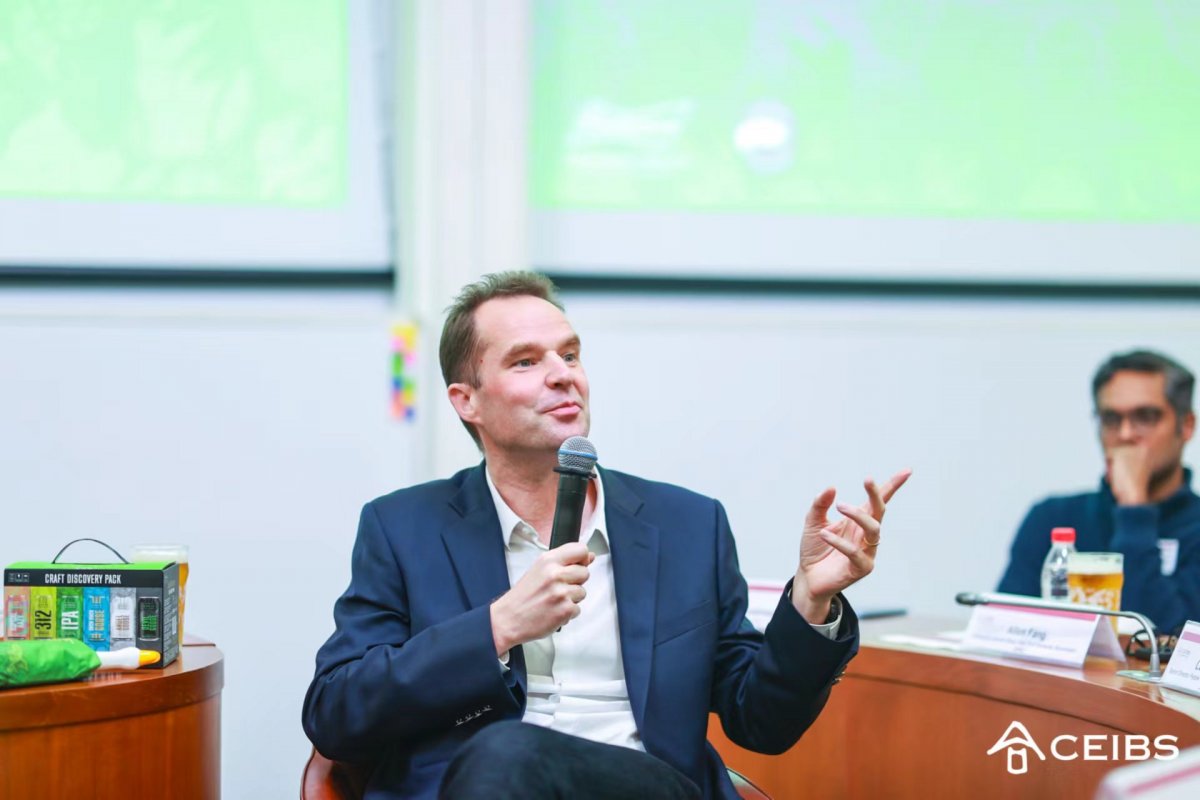Making ESG a strategic priority is key to ensuring a future-proof company
November 23, 2022. Shanghai – Companies will need to make environmental, social, and corporate governance (ESG) a key strategic priority in order to ensure both long-term business success and a sustainable and inclusive future for all of us.
This was just one of the messages delivered to around 100 guests during a special CEIBS Executive Forum dialogue between Jan Craps, Executive Director, Co-Chair of the Board and Chief Executive Officer of Budweiser Brewing Company Limited APAC (Bud APAC) & President APAC Zone at Anheuser-Busch InBev, and Bala Ramasamy, CEIBS Associate Dean (Global EMBA) and Professor of Economics, at CEIBS Shanghai Campus this evening.
During the offline event, the speakers and audience discussed how and why Bud APAC has been motivated to take action and drive an ESG agenda across its entire value chain.
The discussion began with Mr. Craps sharing his personal experiences and ESG journey dating back to his childhood. Mr. Craps showed that throughout his 20-year career, AB InBev’s leadership has authentically embedded three cross-over themes – natural, local, and inclusive – into the company’s business operations.
Beer brewing businesses rely heavily on high-quality agricultural commodities, raw materials for packaging, water resources and energy. As such, Mr. Craps explained, AB InBev’s business is closely tied to the natural environment (and, therefore, to the ‘E’ in ESG).
ESG is embedded in AB InBev’s global operations, he added. For example, diversity and inclusiveness are not only basic values practiced within the group; they are also pushed outward to other people and communities “to create a sustainable and inclusive future with more cheers.”
When it comes to the implementation of effective climate change mitigation and adaptation measures, Mr. Craps pointed out that “scale and market” matter. As the largest beer company in APAC, Bud APAC can leverage its influence in the industry and markets to support its major ESG initiatives around climate action, water stewardship, circular packaging and smart agriculture. In turn, these efforts help it in attracting talents as well.
Mr. Craps further highlighted that, as the result of a collective decision to switch to renewable energy sources and electric shuttle buses and recycle CO2 from its production processes, Bud APAC’s Wuhan brewery became the first carbon neutral plant in China and the first in AB InBev’s global network. Bud APAC has also helped its suppliers implement solar power cost-effectively by sharing its solar panel vendor.
Working hand in hand with farmers is another practice that benefits both Bud APAC and local communities. In addition to obtaining better-quality malting barley, Mr. Craps said, Bud APAC is able to keep its supply chain short to mitigate risks. At the same time, around 5,000 direct farmers in Jinshan, Shanghai and Jiangsu provinces are able to learn about crop management, network and become financially empowered.
In terms of digitalization and AI in ESG practices, Mr. Craps provided an innovation that Bud APAC adopted at its Foshan Brewery which reuses 120 tons of retired EV batteries to store 7.2 million kWh of self-generated electricity from on-site solar panels. The stored electricity is used for producing beer in the brewery itself, and also for charging EV heavy truck batteries.
Last but not least, Mr. Craps highlighted that Bud APAC shares many common features with CEIBS, such as bridging EU-China business ties, educating European businesses about China’s speed, scale and efficiency, and bringing European ESG standards and measures to China.
Today’s Executive Forum was part of a “Beyond Charity” initiated by Prof. Ramasamy to push the CEIBS community beyond the boundaries of “charity facts” by learning from business leaders who have made ESG a strategic priority and embedded it into their organization’s business operations.























